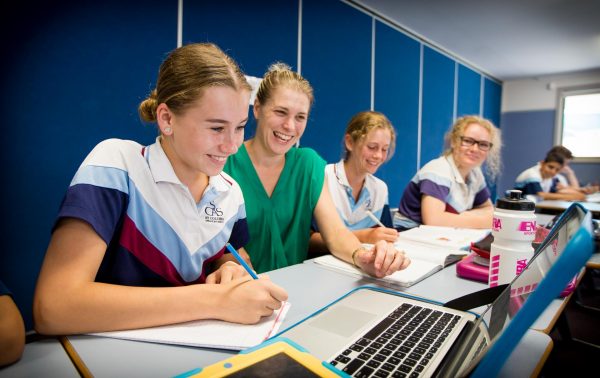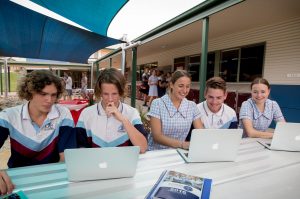
I had a conversation with a friend recently that has been playing on my mind. It was a discussion around the use of electronic devices by students and how frustrating it is as a parent when your child is absorbed by technology.
As a teacher of technology for over 20 years and the communicator of our SCAS’ BYOT policy, I guess I feel some moral responsibility for the over-technification of our students.
Technology is perhaps the ultimate distraction – exciting, interactive, stimulating, rewarding; and for students this distraction often comes under the guise of homework or building relationships. I have actually considered emailing Dulux to suggest they make a metal based paint that can act as a Faraday cage – which would block electromagnetic radiation like wifi and 4G – so clearly I haven’t got the problem solved in my own house.
 I think one of the biggest problems with technology is that we often miss enjoying the moment and personal connections with the people around us. Being present in the here and now.
I think one of the biggest problems with technology is that we often miss enjoying the moment and personal connections with the people around us. Being present in the here and now.
We are always connected, always on. We are even distracted by technology when it isn’t on, wondering how many likes our Facebook post got or feeling “phantom phone vibrations”, where we think our phone is ringing when it isn’t. New terms have come up like “phubbing” —snubbing someone or skipping a social event in favour of playing with your mobile phone…
On the radio recently I heard that in Cologne in Germany they have installed traffic lights in the ground to prevent distracted pedestrians walking into the moving traffic – there is a study underway in Sydney for these too.
Technology isn’t the only thing we have to blame for letting life slip past without engaging fully in it.
I want to briefly look at this idea of being present – enjoying the experience at hand, being interested in the world around us and making the most of the present moment – not just living for a future time.
An article I read last year by Education consultant, Dr Julia Atkin, likens the learning experience of some to a traveller catching an overnight train through a state in the US. The traveller has ticked off that state on her places visited list (or perhaps her Facebook travel map) but travelled through the state completely in the dark!
Some students don’t seem to be on the trip to develop a deep understanding of the places along the way — they are motivated by finishing the trip and scoring the highest marks possible or moving on to the next thing. Or they are so distracted by things like devices that they don’t notice the amazing world passing them by. Sometimes the focus is on ticking the boxes and finishing the trip not on the quality if the journey.
I am sure this is not the case for most of the students here at SCAS, however it is worth thinking about – how do I enjoy the journey and not just focus on finishing the trip? How do I make the most of the journey and develop the skills that will help me to be successful in later life?
We celebrate many wonderful achievements but as you might hope, these aren’t the only things that determine future success. In fact you may be surprised by what some studies have found to lead to professional success and personal happiness.
Former Stanford University Dean Julie Lythcott-Haims, who has written the book “How to Raise an Adult” refers to one of the longest longitudinal studies of humans ever conducted – the Harvard Grant Study – which found a strong correlation between professional success in life and whether or not the person had done chores as a child.
Chores are a bit of an Americanism but for those students who may not do chores or know what a chore is, they are jobs like washing up, cleaning the house, mowing, cooking, etc. I’ll add a disclaimer here too – in referring to this study I’m not just trying to justify the job list I’m going to give my girls over the holidays – I wish I’d come across this research earlier. A poll conducted by Whirlpool found 28% of parents regularly assign jobs around the house to their kids, yet 82% had jobs around the house as kids themselves.
Lythcott-Haims argues that household chores help kids build responsibility, autonomy, and perseverance — traits necessary to becoming capable adults. It makes sense that these jobs help children to see the work that needs to be done around them which leads to a mind-set of pitching in in other settings. In the workplace, this translates to having a vision for what needs to be done and taking the initiative to do it.
Our job as parents is to put ourselves out of a job, and raise our offspring to independence. If we believe this then why do we so often micromanage our kids’ lives. We often think that every activity is a make or break moment for our child and also subconsciously send the message “I don’t think you can achieve this without me”.
Children aren’t “bonsai trees, they’re wildflowers”. We should not be forming them and shaping them into what we want them to be. Instead we must love who they were created to be and encourage their growth. Our job to provide a nourishing environment.
I mentioned that the Harvard Grant study focused on professional success and happiness. The predominant indicator for happiness in life is the extent of loving relationships with other people. Our kids need to be loved unconditionally so they can love themselves and then go out into the world and have the capacity to love and be loved.
Although accolades are great, they aren’t the purpose of childhood. We want our kids to be healthy, mentally well, and curious about the world around them. We want them to have a growth mindset where they know they can improve if they put in effort into any endeavour, and we also want to cultivate good habits that will help them to value what is important.
Bible passages often encourage us to remain humble, recognising that by the grace of God we live in a privileged place and time and have access to so many wonderful opportunities. The Westminster catechism, which summarises many of the Anglican church’s beliefs, states the main purpose of man is to Glorify God and enjoy Him forever.
I encourage you to remember what is important – relationships and enjoying the moment. So take every opportunity to reclaim the love of the journey – get off devices and visit friends, be thankful for the relationships you have and enjoy the beautiful environment in which we live.
 As staff, we have great hope for the young people in our care. We don’t want them to be passive bystanders just trying to “get through” school. We want them to engage in the journey they are travelling and enjoy the challenges they face – to love their time at SCAS, to live life to the full. Who wouldn’t want to be part of a community like that?
As staff, we have great hope for the young people in our care. We don’t want them to be passive bystanders just trying to “get through” school. We want them to engage in the journey they are travelling and enjoy the challenges they face – to love their time at SCAS, to live life to the full. Who wouldn’t want to be part of a community like that?
We celebrate much of what makes this a great school to teach in and in which to be a student. Enjoy the moments!
Geoff Lancaster
Head of Innovative Learning K-12
St Columba Anglican School

